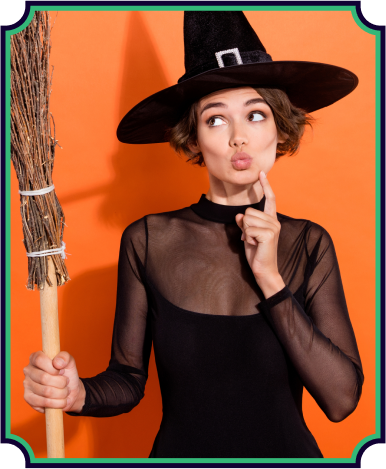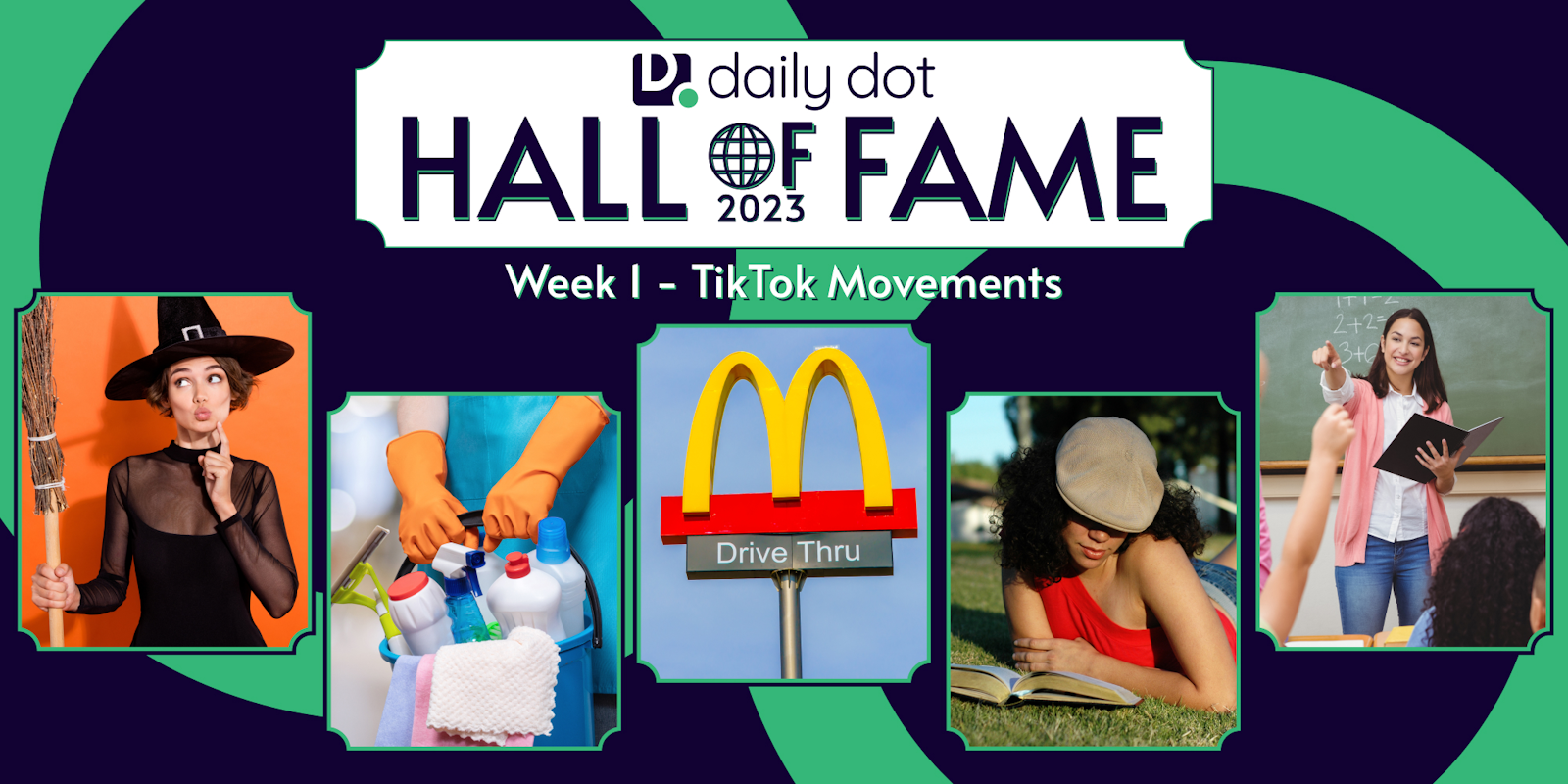We’ve been writing about memes and online movements for 12 years. Last year, the Daily Dot established a Hall of Fame to toast the weird online moments that gave our internet selves a richer and more human online experience.
The plan was straightforward. We report. You decide. We distribute fake internet trophies.
And so readers voted and we inducted Betty White, Baby Yoda, the Babadook, Blinking White Guy Drew Scanlon, and Disaster Girl in 2022 across five categories: “Cultural Moments,” “Deceased Icons” (Harambe narrowly lost out to White), “Big Mood,” “Urban Legends,” and “Vanguards.”
Over the next few weeks, our newsletter readers will vote on 5 categories—each made up of 5 nominees offered up by the editorial staff—and the 5 winners will become the second-annual Daily Dot Hall of Fame inductee class.
Spoiler: There is some TikTok-dominating, Gen-Z-centric recency bias at play here. Somewhere around early 2021, TikTok just became the internet in terms of users (1 billion active and counting) and for its ability to control internet culture. It’s interactive and easy to use. It actually democratizes content by building upon YouTube principles and making the upload and creation process more accessible.
So get ready to feel old, dear reader. (I blame the 20-something editorial staffers we allowed into the decision room.)
Only subscribers of web_crawlr get to vote in the Daily Dot Hall of Fame. If you want to vote on next week’s nominees, subscribe to web_crawlr here.
WitchTok

This misunderstood subgenre of TikTok just has it all. Marginalized voices finding their people; creative solutions to long-simmering problems; fun spells cast on bad people; and certainly an understanding that Wiccan culture is anything but monolithic.
And we love WitchTok because like manosphere podcasts or recipe pushers, it’s really all about evolving the self by nurturing it. As Wolfgang Ruth reported with us: “Unlike people in other digital corners, witches are often focused on self-healing and education. The online result is wholesome—and wicked popular.”
Subscribe here to vote on next week’s nominees.
CleanTok

It’s an ASMR thing for sure. In other words, it is relaxing and nice to watch someone clean on-screen. And for many, CleanTok is already a nostalgic memory that evokes the subtle peace and nervous energy of COVID-era lockdowns.
As senior reporter Audra Schroeder observed, CleanTok emerged because people finally had time to clean their household deeply, with intention. To this day, our readers respond to PSAs about how to properly clean, say, your dishwasher.
It’s all a product of the increasingly personal bond we share with our household. Whereas once we felt more transient and always like we were between places to crash, post-pandemic society has brought us home. And there’s a fuckton of cleaning left to do.
Subscribe here to vote on next week’s nominees.
McTok

Fast food activism has emerged and thrived on TikTok over the past three years and it comes down to the granddaddy of them. McDonald’s is the most important and complex global brand because it feeds everyone, everywhere.
Its politics play out on McTok.
Every few months, someone will post about what happens if you order fresh french fries at McDonald’s and it becomes our biggest story of the week.
We’re gonna tell this one over and over just like any good editor assigns “How to lose weight” stories in January. Former chefs have taken to TikTok to reveal all of the McSecrets about the menu and fans loved hearing about the hashbrown breakfast sandwichthat almost was to the tune of millions of views.
Certainly McDonald’s as a global empire is leaning into that virality and its recent marketing is proof positive as the summer’s Grimace mania became a weird online pro-deep state firestorm of virality. Recently, McDonald’s has appropriated Mumbo Sauce from Black urban areas like Chicago and D.C. and used TikTokers of color to sell it.
But what really matters is the workers using TikTok as a platform to speak truth to power and it helps us all be more considerate consumers along the way as we continue to live under the tyrannical Golden Arches.
Subscribe here to vote on next week’s nominees.
BookTok

We’re still understanding what BookTok has meant to American literacy but it’s a whole lot.
Publishers are planning releases around BookTok and that’s because the subgenre is effectively an Internet-wide book club where fans can dish out about their favorite literary figures and ideas. Reading is a solitary experience and it’s difficult to find like-minded locals who enjoy their library cards, after all.
BookTok flows with an undercurrent of important political movements like “dissociative feminism.” Whereas fanfiction thrived on free-wheeling forums you had to search for, BookTok for, better or worse, rewards cults of personality and parasocial creator relationships.
This does make it more accessible and good for the bottom lines of people who sell and write books. So much so that a professional hockey team, the Seattle Kraken, had to begin posting solely about BookTok after one of its players unwillingly became a BookTok idol.
Subscribe here to vote on next week’s nominees.
TeacherTok

At first it was cute, teachers sharing relatable things about their profession online. Mechanics and aestheticians do this too. But then TeacherTok got existential and became a scathing indictment on the American education system.
Teachers would post creative slideshow presentations. Sometimes, Fox News would target their popularity and start a culture war using hate speech dog whistles.
Now teachers post about how they had to quit on the first day because it was overwhelming and futile to try. Now teachers post about how they cannot afford to live in an American city with these wages despite having a second job. Now teachers post about how their middle school students don’t know the alphabet.
There are still nice moments of fleeting joy. But they said hip-hop was the “CNN of the streets”—now it’s TeacherTok.
Subscribe here to vote on next week’s nominees.



